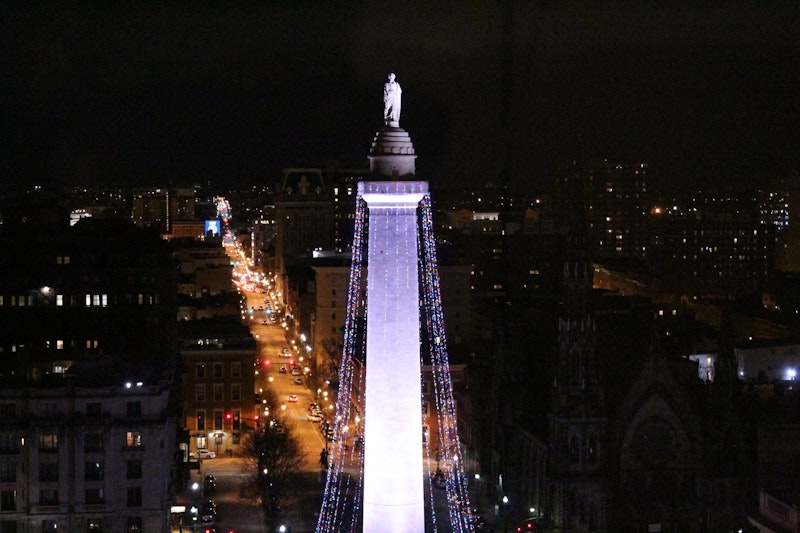Three or four times a week, as I scan the headlines in print newspapers or Twitter, there are brief notices about retail stores closing in this or that city, usually because they’re “underperforming” or worn out from crime and vandals. In the past year, San Francisco—even as California’s skeezy Gov. Gavin Newsom attempts to hog a national platform, in case Joe Biden punks out (as he should) for 2024—has taken the brunt of tut-tutting as institutions like Nordstrom, Whole Foods and Anthropologie close their doors. It’s happening in every city, for various reasons, but honestly, when a bookstore or once-famous restaurant in St. Louis folds I don’t think about it much, because I don’t live there. Parochialism on my part, but it’s not so different from decades ago when parents would scold their children for not cleaning their dinner plates, saying, “People are starving in Ethiopia!” As if a 10-year-old American kid, if he or she had even heard of that country, was concerned.
But when you’re affected by a store going out of business it’s a different story. In the past two weeks, two places I often frequent in Baltimore have announced they’re going kaput and it’s a pain in the neck. There’s a CVS a block from the Splice Today offices in lower Charles Village that my son Nicky and I patronize several times a week, for stamps, prescriptions, Cheetos, a cheapo umbrella, Band-Aids and a box of Dots. It’s closing in mid-July—for “underperformance”—and though there’s another CVS six blocks away the convenience factor is gone. Granted, this 2504 N. Charles St. location has teetered since the pandemic: one entrance was closed; razor blades, toothpaste, Advil and shampoo were under lock and key because of theft; and mid-day hold-ups and shouting matches weren’t uncommon. Customers will adapt, as always, but I’ll miss some of the regular workers there, with whom I shared jokes, pleasantries and the small talk that’s not really “small” if you enjoy it. As an old song goes, “It’s nice to be nice.”
The building itself is ugly but functional (I can’t recall what business occupied the space in the late-1970s and 1980s when City Paper was located just up the street). I’ll bet once CVS closes, and transfers some of its employees to other locations, the storefront will remain vacant, perhaps for years. It’s too big for an independent retail outlet and not big enough for a “big-box” chain; besides, the neighborhood is “troubled” so who’s going to take a chance on making a go of it? The city could use the space for another methadone clinic, I guess, but it’s more likely squatters will take over, and it’ll be another blight on N. Charles St., once Baltimore’s grand main thoroughfare, packed with restaurants, boutiques, book and record stores, cafes and old-fashioned banks. I wouldn’t be surprised if the Safeway supermarket just south of the CVS is on borrowed time as well: it’s not as crowded anymore, hand carts are no longer available for customers because of theft and the in-store Starbuck’s, once crowded, is a ghost space within a ghost space. I’d suggest, in the impossible likelihood that Mayor Brandon Scott, solicited my advice, that he twist the arms and legs of CVS to sell the space for a buck and let some imaginative entrepreneur take over.
The current disrepair of N. Charles St. reminds me of one day in 1989, when my friend Jim Larkin—once co-owner of the New Times weekly newspaper company, and currently enmeshed in a five-year and vindictive free speech trial with his partner Mike Lacey—and I drove around Houston and because of the Texas oil bust in the 1980s it seemed that every other home had a “for sale” sign planted in the yard, storefronts were papered over and office buildings were selling for 20 cents on the dollar. Houston, and Texas, recovered shortly, and Larkin and Lacey founded the robust Houston Press, but that was decades ago in, for better or worse, an America that’s unrecognizable today.
Just last weekend I learned that a once-thriving supermarket, Eddie’s in the Mount Vernon neighborhood, will close at the end of this month, leaving residents with few nearby choices to buy… food. I don’t live near that Eddie’s today, but have made monthly visits to buy Merit Blue cigarettes, since it’s one of the few outlets that carry the brand, and they don’t enforce the insane identification ritual for people who no longer look like they’re 21 or younger.
Last time I went, and chatted with a lovely lady—usually wearing a Ravens sweatshirt and in December a bright Christmas outfit—who’s become a casual friend, I had an inkling something was amiss when the store no longer stocked shampoo. Years ago, when I lived in Mt. Vernon, Eddie’s was my regular supermarket, and though it wasn’t spiffy like the Rotunda’s Giant (where there was always the danger of running into people you didn’t want to run into; it’s gone now, too), it fulfilled my low-budget needs. Cheap pork chops, chicken livers, onions, broccoli and, if you were lucky, fruit that wasn’t overripe; it was a place I could go with seven bucks in my pocket and buy the makings of dinner for two nights. Like the N. Charles St. CVS, this Eddie’s probably won’t be replaced any time soon and the neighborhood is worse off.
—Follow Russ Smith on Twitter: @MUGGER2023

